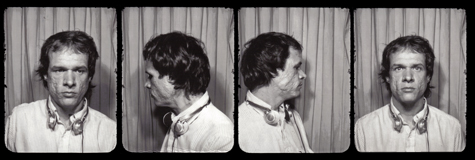
REVEALING BUT STILL ENIGMATIC Arthur Russell. |
Arthur Russell's music does little to illuminate the mysteries and vagaries of his life. It simply tosses them aside, in pursuit of moods and rhythms few have successfully replicated, two decades later.Russell was always recording but didn't release very much music. He was, at times, a controlling, paranoid, and perfectionistic musician, but he was also a helplessly social one: in New York's downtown scene of the
| WILD COMBINATION: A PORTRAIT OF ARTHUR RUSSELL | directed by Matt Wolf | released by Plexifilm | 71 minutes | screening at SPACE Gallery, in Portland | April 23 @ 7:30 pm | followed by performance by Nat Baldwin | $8, members $6, all ages | 207.828.5600 |
1970s, he worked with Philip Glass, Allen Ginsberg, Ernie Banks of the Modern Lovers, and David Byrne (very nearly becoming a member of the Talking Heads). Russell was self-conscious about his acne scars, but was photographed in poses that exaggerate their severity. He loved going to disco clubs but didn't like dancing. He ran away from his quaint upbringing in the farmland of Iowa to become a gay Buddhist in early-'70s San Francisco, but his music betrays no trace of angst or anger about his past. Russell wanted to be famous, but knew that his music was too unusual to be appreciated by large audiences. He died of AIDS in 1992, at 40, but even as his music grew darker and more isolated in his final years, its hopeful essence never diminished.Neither Matt Wolf's gentle, lovely documentary, Wild Combination: A Portrait of Arthur Russell (screening April 23 at SPACE Gallery), nor the spate of compilations and reissues released this decade shed much light on these curiosities. The eight albums — culled from the 1000-plus cassettes and reel-to-reel tapes Russell left behind — reveal a tremendously diverse artist, who produced disco hits and performed avant-garde solo cello-and-voice pieces along with folk and pop songs. The tissue binding this work is distinctive but difficult to categorize. Twenty years out, his music seems less ahead of its time than outside the world itself, often sounding like sketches of love songs written in exotic, subterranean waters.
Abstract expressions
The modest aspirations of Wild Combination are a useful corrective to the muckraking or hero-worship of most contemporary non-fiction music films. It begins with some of Russell's echo-y cello music, set to beautiful, interpretive imagery — city lights shooting and glittering at high speed; a cassette unspooling underwater, bathed in a red glow — one of a few passages of the film that pose Russell's work in a purely experiential light.
Like the artist himself, Wolf isn't interested in exploring Russell's certainly complicated emotional life — his searching childhood, his struggle with AIDS. Instead, he lays out a simple framework through which to appreciate Russell's restless and diverse experimentation. Friends and relations of Russell — his long-term boyfriend, Tom Hall; Philip Glass; Russell's parents; the musician Steven Hall — discuss his devotion to his cello and to making and listening to music, and share ideas of what he was seeking to achieve. Glass suggests his ambition was to create "Buddhist bubblegum" music; Steven Hall suggests that Russell was able to create such a wide-ranging yet unique and coherent body of work because "Arthur ... was not tied to any of these styles. Arthur was tied to Arthur." The commentary is appropriately abstract; no one seems to know quite what Russell was on to, and the live video footage and audio montages that abut these discussions feel more like transporting pauses than validations of any of these opinions.
 Topics
Topics:
Features
, Nat Baldwin, Dirty Projectors, Ernie Banks, More  , Nat Baldwin, Dirty Projectors, Ernie Banks, Chris Gray, Philip Glass, Philip Glass, David Longstreth, Allen Ginsberg, Allen Ginsberg, Jens Lekman, Less
, Nat Baldwin, Dirty Projectors, Ernie Banks, Chris Gray, Philip Glass, Philip Glass, David Longstreth, Allen Ginsberg, Allen Ginsberg, Jens Lekman, Less 